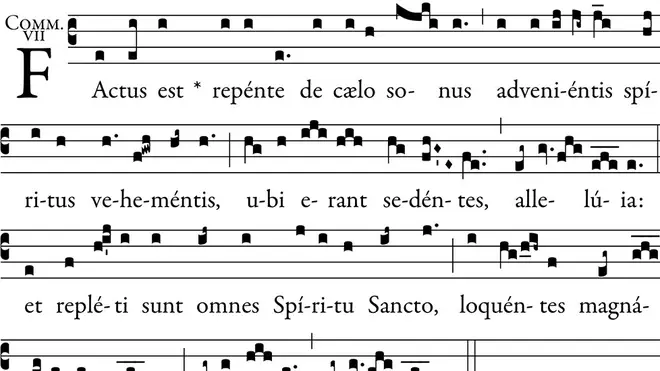French Benedictine nuns release 7,000 hours of Gregorian chant
20 November 2020, 14:56

An abbey of French Benedictine nuns is taking part in the largest recording project in history, bringing the complete Gregorian chant to the modern world and breathing new life into an extraordinary 1,200-year-old tradition.
At a time when people are turning to music for comfort and solace, one man has taken on the mammoth task of bringing the entire Gregorian chant to the world, for free.
Every day for three years, US musician John Anderson is recording the daily plainchant sung by a community of 45 nuns, who live in seclusion at the Abbey of Notre-Dame de Fidélité of Jouques, near Aix-en Provence in southern France.
He installed microphones in the abbey’s chapel, and at the end of each day the audio is uploaded to a remote drive, allowing the recording to take place without disrupting the sisters’ way of life.
The result is 7,000 hours of chants which make up the entire Gregorian repertoire, some of which have never been recorded before (listen in the video below).
Read more: Gregorian chant in an 11th-century church tower is breathtaking >

Holy Week Chants from the Abbey of Jouques - Good Friday 2020
What is Gregorian chant?
Gregorian chant, which originated in the 8th century, follows St Benedict’s rule, in which the day is divided into manual and intellectual work, and prayer and rest, starting at 5am with the chanting of matins.
Speaking to Classic FM about his visit to the abbey, Anderson says: “For a few days I would wake up at 5am and try to follow their life and understand why they do it.
“It’s extremely beautiful. They spend half the day in the church, praying and singing. And they do this every day of the year, for their entire lives. It’s like one long song. It fills time but it also defines the shape of it.”
The abbey is currently closed as a result of rules applied to prevent the spread of coronavirus. Instead of welcoming a congregation at Easter, the nuns instead agreed to the release of a week’s worth of chants for Holy Week, the highlight of the liturgical year. The rest of the chants are now all live on Anderson’s web and mobile app, Neumz.

What does the Neumz app do?
In Neumz, the chants are gathered together in one resource alongside the scores, Latin texts, and translations of the complete Gregorian chant.
Anderson says the idea for the project was sparked by a fascination with his “mythical aunt”, who ran away the morning after her brother – Anderson’s father’s – wedding, to become a nun at the Jouques abbey.
“I grew up always hearing about these stories of Gregorian chant, of medieval Europe and this mythical aunt that I’d never met,” he tells Classic FM.
As a young man, the summer before moving to Oxford University to study Music, John visited his aunt in Provence for the first time and, he says, “it opened me up to this entire world”. Gregorian chant isn’t for the nuns, Anderson realised during his visit, but a prayer for humanity.
“These aren’t the personal prayers of the sister,” he says. “Yes, they are cloistered and cut off from the world, but they are here for us. Their life is in prayer for all of us, the salvation of mankind. When they sing these chants, they’re doing it for us.”
“It’s music which is not an individual soloist showing off their vocal process. It’s not western classical music in that it’s not an individualistic story. It’s more abstract. A common prayer, not a personal prayer. It’s a prayer that they offer on behalf of all humanity.”

After negotiating with the nuns, Anderson, who is also a record label owner, had eight microphones installed in the chapel which recorded into a device that saves the music to SD cards. The nuns press “record” every time they enter the church and “stop” when they leave after each service.
Anderson, whose project will raise money for the abbey’s sister monastery in Benin, west Africa, says the launch has come at a strangely pertinent time.
“The sense of time in a monastery, and in the chant, is rather like we are experiencing in this period,” he says. “Everything is regular, and while one day can feel very long, three months can feel like a week. You lose perspective of where you are in time.
“The nuns spend half the day in the church, praying and singing. And they do this every day of the year, for their entire lives. It’s like one long song, and it’s a good lesson for people always,” he adds, joking: “The nuns are expert at quarantine.”
Read more: 23 times classical music embraced quarantine in a wonderful way >

What are neumes?
Neumz is named after the scratches you’d find above the text in a Gregorian chant score: neumes (see a modern version in the image above) which literally mean ‘breaths’. In theory, neumes tell you whether the pitch goes up or down from the previous note. It was how people notated music before modern staves were invented, some hundreds of years later.
For most people, Anderson says, listening to the chants is a powerful exercise because “it’s the right music for vacating yourself of a sense of time and pressure”.
“You can find a spirituality or mindfulness,” he says. “And in a period when everything is so individualistic, I think it’s going to be refreshing for people to see this ancient tradition practised uninterruptedly which challenges the modern world.
“There’s something more than just you and your concerns. It’s music which immediately takes you into this sense of eternal time and spirituality.”
This Christmas season, Neumz will have its own digital Advent Calendar from 29 November, marking the official launch of the Neumz mobile apps. Every day leading up to Christmas, users will be able to enjoy the complete liturgy as sung by the Benedictine nuns of the Abbey of Notre-Dame de Fidélité of Jouques through the new apps.









































